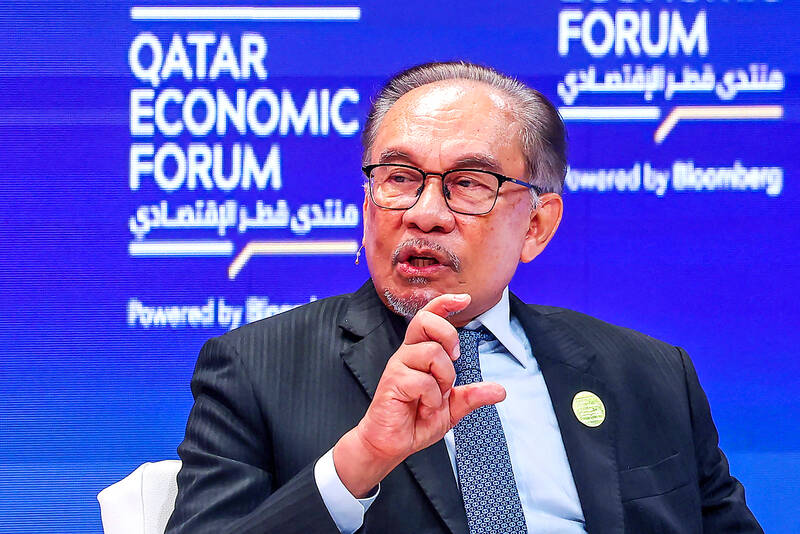Malaysia is targeting at least 500 billion ringgit (US$107 billion) in investment for its semiconductor industry, Prime Minister Anwar Ibrahim said yesterday, as the Southeast Asian country looks to position itself as a global manufacturing hub.
Malaysia is a major player in the semiconductor industry, accounting for 13 percent of global testing and packaging. It has attracted multibillion-dollar investments from leading firms in recent years, including Intel Corp and Infineon Technologies AG.
Anwar said the investment being sought would be for integrated circuit design, advanced packaging and manufacturing equipment for semiconductor chips.

Photo:Karim Jaafar, AFP
Malaysia also wants to establish at least 10 local companies in design and advanced packaging for semiconductor chips, with revenues between US$210 million to US$1 billion, Anwar said in a speech at an industry event.
The Southeast Asian country will allocate US$5.3 billion in fiscal support to meet these targets, he added, saying further details would be announced later.
“We have a strong capacity to diversify and move higher in the value chain ... to move towards even more high-end manufacturing, semiconductor design and advanced packaging,” Anwar said.
He did not specify a timeline for the targets to be met.
On April 22, Anwar said Malaysia planned to build Southeast Asia’s largest integrated circuit design park and would offer incentives including tax breaks, subsidies and visa exemption fees to attract global tech companies and investors.
He said the proposed integrated circuit design park was part of Malaysia’s efforts to move beyond backend chip assembly and testing and into high-value, front-end design work.
Malaysia is seen as well placed to grab further business in the semiconductor sector, as Chinese chip firms diversify outside of China for assembling needs.
China’s xFusion Digital Technologies Co (超聚變), a former Huawei Technologies Co (華為) unit, said in September last year that it would partner with Malaysia’s NationGate Holdings Bhd to manufacture GPU servers — servers designed for data centers and which are used in artificial intelligence (AI) and high-performance computing.
Shanghai-based StarFive Technology Co (賽昉) is also building a design center in Malaysia’s Penang state, while chip packaging and testing firm TongFu Microelectronics Co (通富微電) said in 2022 it would expand its Malaysia facility — a venture with US chipmaker Advanced Micro Devices Inc.
Germany’s Infineon said in August last year it would invest 5 billion euros (US$5.4 billion) to expand its power chip plant in Malaysia, while US chipmaker Intel announced in 2021 it would build a US$7 billion advanced chip packaging plant in the country.

When an apartment comes up for rent in Germany’s big cities, hundreds of prospective tenants often queue down the street to view it, but the acute shortage of affordable housing is getting scant attention ahead of today’s snap general election. “Housing is one of the main problems for people, but nobody talks about it, nobody takes it seriously,” said Andreas Ibel, president of Build Europe, an association representing housing developers. Migration and the sluggish economy top the list of voters’ concerns, but analysts say housing policy fails to break through as returns on investment take time to register, making the

NOT TO WORRY: Some people are concerned funds might continue moving out of the country, but the central bank said financial account outflows are not unusual in Taiwan Taiwan’s outbound investments hit a new high last year due to investments made by contract chipmaker Taiwan Semiconductor Manufacturing Co (TSMC, 台積電) and other major manufacturers to boost global expansion, the central bank said on Thursday. The net increase in outbound investments last year reached a record US$21.05 billion, while the net increase in outbound investments by Taiwanese residents reached a record US$31.98 billion, central bank data showed. Chen Fei-wen (陳斐紋), deputy director of the central bank’s Department of Economic Research, said the increase was largely due to TSMC’s efforts to expand production in the US and Japan. Investments by Vanguard International

WARNING SHOT: The US president has threatened to impose 25 percent tariffs on all imported vehicles, and similar or higher duties on pharmaceuticals and semiconductors US President Donald Trump on Wednesday suggested that a trade deal with China was “possible” — a key target in the US leader’s tariffs policy. The US in 2020 had already agreed to “a great trade deal with China” and a new deal was “possible,” Trump said. Trump said he expected Chinese President Xi Jinping (習近平) to visit the US, without giving a timeline for his trip. Trump also said that he was talking to China about TikTok, as the US seeks to broker a sale of the popular app owned by Chinese firm ByteDance Ltd (字節跳動). Trump last week said that he had

STRUGGLING TO SURVIVE: The group is proposing a consortium of investors, with Tesla as the largest backer, and possibly a minority investment by Hon Hai Precision Nissan Motor Co shares jumped after the Financial Times reported that a high-level Japanese group has drawn up plans to seek investment from Elon Musk’s Tesla Inc to aid the struggling automaker. The group believes the electric vehicle (EV) maker is interested in acquiring Nissan’s plants in the US, the newspaper reported, citing people it did not identify. The proposal envisions a consortium of investors, with Tesla as the largest backer, but also includes the possibility of a minority investment by Hon Hai Precision Industry Co (鴻海精密) to prevent a full takeover by the Apple supplier, the report said. The group is